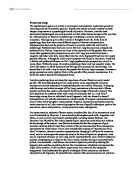For many centuries, students of human nature considered the idea of an unconscious mind as self contradictory. However, it was noticed by philosophers such as St. Augustine, and others, as well as early experimental psychologists, including Gustav Sechner, and Hermann Von Helmholtz, that certain psychological operations could take place without the knowledge of the subject. Jean Sharcot demonstrated that the symptoms of post-traumatic neuroses did not result from lesions of the nervous tissue but from unconscious representations of the trauma. Pierre Janet extended this concept of "unconscious fixed ideas" to hysteria, wherein traumatic representations, though split off from the conscious mind, exert an action upon the conscious mind in the form of hysterical symptoms. Janet was an important influence on Carl Jung, and he reported that the cure of several hysterical patients, using hypnosis to discover the initial trauma and then having it reenacted by the patient, was successful. Josef Breuer also treated a hysterical patient by inducing the hypnotic state and then elucidating for her the circumstances which had accompanied the origin of her troubles. As the traumatic experiences were revealed, the symptoms disappeared. Freud substituted the specific techniques of free association and dream interpretation for hypnosis. He stated that the content of the unconscious has not just been "split off," but has been "repressed," that is forcibly expelled from consciousness. Neurotic symptoms express a conflict between the repressing forces and the repressed material, and this conflict causes the "resistance" met by the analyst when trying to uncover the repressed material. Aside from occasional psychic traumas, the whole period of early childhood, including the Oedipus situation or the unconscious desire for the parent of the opposite sex and hatred for the parent of the same sex, has been repressed. In a normal individual, unknown to himself or herself, these early childhood situations influence the individual's thoughts, feelings, and acts; in the neurotic they determine a wide gamut of symptoms which psychoanalysis endeavors to trace back to their unconscious sources.
During psychoanalytic treatment, the patient's irrational attitudes toward the analyst, referred to as the "transference," manifests a revival of old forgotten attitudes towards parents. The task of the psychoanalyst, together with the patient, is to analyze his resistance and transference, and to bring unconscious motivations to the patient's full awareness. Carl Jung considered the unconscious as an autonomous part of the psyche, endowed with its own dynamism and complementary to the conscious mind. He distinguished the personal from the collective unconscious; the later he considered to be the seat of "archetypes" - - universal symbols loaded with psychic energy.
As new approaches to the unconscious came about, Jung introduced the word association test, that is, spontaneous drawing, and his own technique of dream interpretation. His therapeutic method aimed at the unification of the conscious and the unconscious through which he believed man achieved his "individuation," the completion of his personality. Both Sigmund Freud and Carl Jung's concepts of the unconscious have provided a key to numerous facts in psychology, psychiatry, anthropology, and sociology, and for the interpretation of artistic and literary works. (Ellenberger, 1) Hypnosis has contributed largely to our understanding of psychoanalysis. Carl Jung understood this and utilized hypnosis throughout his many experiments and tests. In recent times, our understanding of the unconscious has been expanded due to experimental hypnosis an, as well, projective psychological tests. It has been observed that Jung's relations with the other significant people in his life appear to have been as unsatisfactory as his own. It has been observed that Jung despised his pastor father as a weakling and failure and had mixed feelings about his mother. After Jung broke with Freud, his former collaborator and mentor, Jung went on to develop his own psychological system. This incorporated a number of key concepts which included the collective and conscious, the repository of mankind's psychic heritage, and realm of the archetypes - - inherited patterns in the mind that exist through time and space. Then there were anima/animus, the image of contrasexuality in the unconscious of each individual, and shadow, the repressed and wanted aspect of a person. There is also the theory of psychology types, i.e. introverts, and extraverts, which influenced William James' dichotomy of tough and tender minded individuals. Jung also developed his theory of individuation, which holds that each individual's goal in life is to achieve his own potential. These theories on the different approaches to psychoanalysis each have valid points. As such, theories will always have to deal with paradigmatic assumptions. These are ideas that the theorist has taken for granted as facts. An example is Freud's notion that women suffer from a lack of self-esteem or self worth all their lives because of penis envy. Freud's assumption could have derived merely because of the time when he lived, and it was a time when women were treated as second class citizens. Freud's assumption that sex is the driving force behind everything could also be a product of his times. Sexual feelings were often repressed. The problem with paradigmatic assumptions is that each person grows up in a different culture and some theories don't apply to everyone. The problem with psychology remains that it is not an exact science. Though Jung's ideals may have been molded by Freud and further critiqued and perfected, it may further be perfected in the future. And such is the arena of science, an ever-changing, dynamic field that undergoes much scrutiny and much refinement.
Works Cited
Carl Gustav Jung: BK. Rev. The Economist, Vol. 340 September 14, 1996 Coon, Dennis. Introduction to Psychology: Exploration and Application, 7th Edition.
Minnesota: West Publishing Company, 1995.
Ellenberger, Henri F. The Discovery of the Unconscious. The History and Evolution of Dynamic Psychiatry. New York: Basic Books, 1970.
Freud, Sigmund. The Basic Writings of Sigmund Freud. Brill, A. A.: Dodd, Mead and Company, Inc., July 1979.
Piaget, Jean, et al. The Psychology of The Child. Berkeley and Los Angeles: University of California Press, Ltd., 1972.







